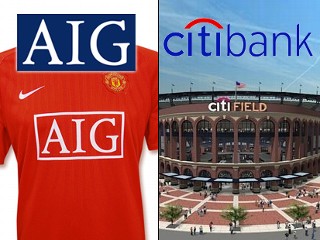Wachovia Corp (NYSE:WB), which lost $33 billion in the last two quarters, said 10 top executives may be entitled to $98.1 million in severance pay after the bank is acquired by Wells Fargo & Co (NYSE:WFC).
Wachovia also said a closing would entitle its 11 executive officers, who include Steel, as well as Chairman Lanty Smith to $2.5 million in equity-based awards under existing stock incentive plans. But the executives' stock options are worthless, the bank said.

 Economic Glance
Economic Glance AIG, Citibank and a number of other federally bailed-out financial institutions have no plans to cancel hundreds of millions of dollars in sports team sponsorships, even as they take billions in taxpayer support, ABC News has found.
AIG, Citibank and a number of other federally bailed-out financial institutions have no plans to cancel hundreds of millions of dollars in sports team sponsorships, even as they take billions in taxpayer support, ABC News has found.  The global economy may be undergoing a significant downturn, but the White House's dinner budget still appears flush with cash.
The global economy may be undergoing a significant downturn, but the White House's dinner budget still appears flush with cash.






























